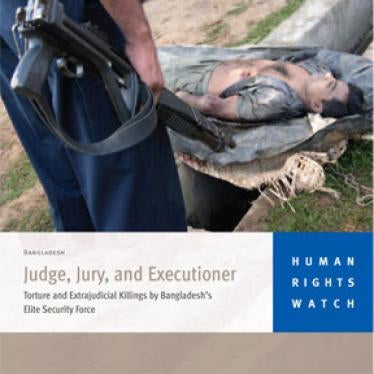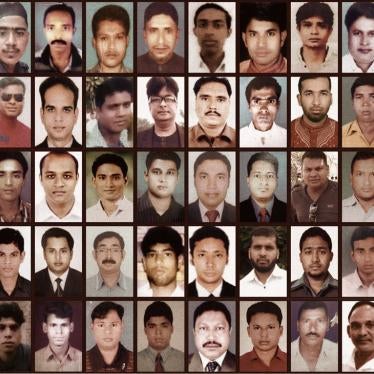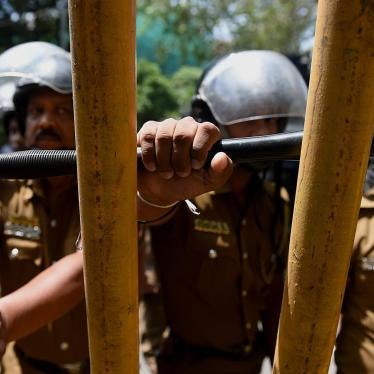(New York) - Bangladesh’s elite anti-crime and anti-terrorism security force is responsible for widespread torture and killing more than 350 suspects in custody, Human Rights Watch said in a report released today. Human Rights Watch warned that the former ruling party could use the abusive force for political purposes prior to elections slated for January 23, 2007.
The 79-page report, “Judge, Jury, and Executioner: Torture and Extrajudicial Killings by Bangladesh’s Elite Security Force," describes how the Rapid Action Battalion (RAB), established in 2004 to stop spiraling crime, has made a practice of killing criminal suspects in detention. Torture methods used by the force include beatings, boring holes in suspects with electric drills, and the application of electric shock.
“Bangladesh’s Rapid Action Battalion has become a government death squad,” said Brad Adams, Asia director at Human Rights Watch. “Its methods are illegal and especially shameful to a nation whose citizen just won the Nobel prize for peace.”
Even Bangladeshi government officials told Human Rights Watch that the government had given the force a mandate to kill suspected criminals instead of making arrests. One top official said the government had drafted a list of most-wanted criminals for RAB to kill.
The government led by the Bangladesh Nationalist Party (BNP), in power for the two-and-a-half years covered by the report, has defended RAB killings by saying the victims were “wanted criminals” or “top terrors” who died when they resisted arrest or were caught in “crossfire” between the force and criminal gangs. But a year-long investigation by Human Rights Watch found that many suspects died in RAB custody, either after being tortured or by an extrajudicial execution.
Because of RAB killings, Bangladeshis commonly use the word “crossfire” as a verb meaning to murder or to kill.
The BNP-led government resigned in October and Bangladesh is currently run by a caretaker government in preparation for the January elections. Under the caretaker government, RAB killings have continued apace.
Since 2004, the Rapid Action Battalion has flaunted its violent behavior as a way to intimidate and scare people, the report says. Dressed in black uniforms, with black wrap-around sunglasses and black bandanas, RAB members often leave the bodies of their victims on the street to be seen by passers-by and media crews.
Many of RAB’s victims were criminal suspects who ran afoul of people or gangs with political ties. Some of the killings appear politically motivated. In July 2004, RAB members tortured to death a witness to the murder of a prominent opposition member of parliament. In March 2006, RAB killed “in crossfire” a political activist for the opposition who had been working on behalf of poor villagers engaged in a land dispute with a cousin of the state minister for home affairs. Some victims were reportedly activists of a banned communist group, the Purba Banglar Communist Party.
To date, not a single RAB member is known to have been criminally convicted for having tortured or killed a detainee. The most serious reported punishment for a “crossfire” death is dishonorable discharge, an administrative sanction.
“The fact that no RAB member has been criminally prosecuted for any of these killings is a great stain on Bangladesh,” said Adams. “The country has very capable lawyers and judges, so it’s clear that a decision not to prosecute these killers has come from above.”
The government of former Prime Minister Begum Khaleda Zia, which created the Rapid Action Battalion in 2004, has sought to deflect criticism by saying that strong measures are needed to combat violent crime. “Criminals cannot have any human rights,” State Minister for Home Affairs Lutfozzaman Babar said on RAB’s first anniversary.
“The government has an obligation to fight crime,” said Adams. “But no government should authorize murder as a weapon in the battle for law and order.”
Human Rights Watch compiled a database of reported RAB killings between June 2004 and September 2006, based primarily on reports from Bangladeshi media, Bangladeshi human rights groups, and its own research. As of October 1, 2006, RAB was responsible for the deaths of 367 people around the country since its creation two-and-a-half years earlier – an average of more than 13 per month. The youngest victim was 14 years old, the oldest 65, and all were male. Case studies in the report document some of the torture and killings in depth.
Of all reported RAB killings, 32 percent took place in Dhaka division, followed by Khulna division with 29 percent. But the number of killings to population size was by far the highest in Khulna.
The report provides a history of RAB and a description of its structure and top commanders, many of whom have served in United Nations peacekeeping operations. Bangladesh is currently the second largest contributor of troops to UN peacekeeping operations around the world.
On October 27, 2006, the Zia government’s mandate expired and a caretaker government run by President Iajuddin Ahmed was appointed to run the country until the January elections. On October 31, the caretaker government replaced the RAB director general, but over the next four weeks, RAB was implicated in the deaths of 17 people.
Human Rights Watch is concerned that Zia’s Bangladesh Nationalist Party, which maintains great influence over the caretaker government and its security structures, may use RAB for political means during the campaign.
On December 9, Ahmed deployed the military throughout the country to “ensure security” before the elections. A 14-party opposition coalition has staged frequent demonstrations in recent weeks calling for electoral reform amid charges of bias by the caretaker government and large-scale voter registration fraud. More than 40 people have died and scores have been injured in pre-election protests.
Despite fierce criticisms of RAB in the past, the main opposition party, the Awami League, has said the party will leave the force in place if it comes to power.
The party has pledged to stop abuses and to subordinate RAB to political control, but Awami League leader Sheikh Hassina has also said she would use the force to fight corruption. Human Rights Watch pointed out that a heavily armed 8,500-member paramilitary force is not the proper tool for an anti-corruption fight.
Human Rights Watch called on both major parties, the BNP and Awami League, to clarify their positions on the future of RAB and how they will hold officers accountable for human rights violations.
“Whoever wins the elections must fundamentally reform the Rapid Action Battalion or abolish it,” said Adams.
The report urged Bangladesh’s international donors not to provide material or financial support to RAB so long as it persists in using torture and extrajudicial killings. The United Nations should thoroughly review the participation in peacekeeping operations of all Bangladeshi soldiers and police who have worked in RAB to ensure that they have not been responsible for ordering or tolerating serious violations of human rights.







